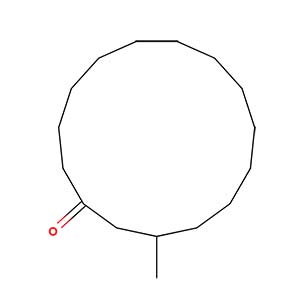Muscone is a prominent fragrance note that belongs to the musk family, originally derived from the glandular secretions of the male musk deer (Moschus moschiferus). Historically, natural musks were highly prized in perfumery for their rich, deep, and long-lasting aroma, which provided a sensual and alluring base to various fragrance compositions. However, due to ethical concerns and the endangered status of musk deer, the use of natural muscone has been largely discontinued. Today, Muscone is predominantly synthesized in laboratories, allowing perfumers to replicate the coveted musky scent without harming wildlife. Synthetic Muscone retains the characteristic warm, earthy, and slightly sweet nuances of its natural counterpart, offering excellent fixative properties that enhance the longevity of fragrances. It is widely used in a variety of fragrance families, including Musky, Oriental, and Woody, to add depth, complexity, and a lingering sensuality to perfumes. Muscone's versatility and enduring appeal make it a staple ingredient in both niche and mainstream fragrance creations.
Natural or Synthetic?
Muscone is exclusively used in its synthetic form in perfumery due to ethical and sustainability concerns associated with extracting it from natural sources. The traditional method of obtaining Muscone involves harvesting the glandular secretions of the male musk deer, a practice that is both unethical and illegal in many parts of the world due to the endangered status of these animals. Consequently, synthetic Muscone was developed to provide a cruelty-free alternative that replicates the natural musk scent effectively. The synthetic production of Muscone involves complex organic synthesis processes, typically starting from petrochemical precursors. Advanced techniques such as catalytic hydrogenation and cyclization are employed to construct the macrocyclic structure characteristic of Muscone, ensuring high purity and consistency. This synthetic approach not only addresses ethical concerns but also allows for large-scale production, making Muscone more accessible and cost-effective for use in a wide range of fragrances.
Fragrance Families Muscone Most Commonly Found In
Show fragrances that contain Muscone as a note




